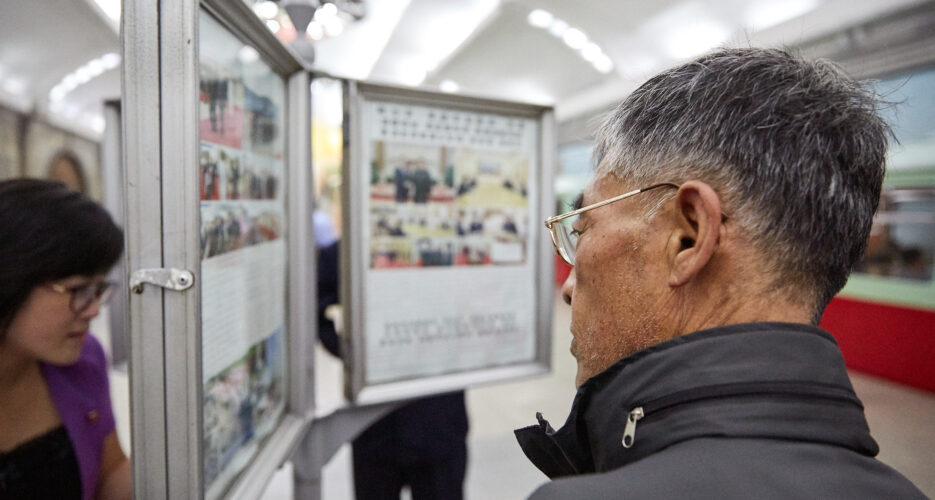Seoul preparing to allow access to North Korean media: Unification ministry
Move aims to encourage Pyongyang to open up to South Korean media and would relax ban on viewing DPRK propaganda
Chad O'Carroll | Ethan Jewell July 23, 2022

SHARE
North Koreans read a newspaper in the Pyongyang metro on Sept. 19, 2018 | Image: NK News
South Korea is preparing to allow its citizens to view North Korean broadcasts in a bid to improve inter-Korean relations, a unification ministry spokesperson told NK News Friday, a move that would relax decades-long censorship of DPRK state media.
But the ministry provided few details about how it will implement this policy change, and experts say Pyongyang is unlikely to open up to South Korean media as Seoul seeks.
“In line with the basic policy of inducing North Korea’s participation, the ministry is planning to allow access to North Korean broadcasts to try to encourage North Korea to take similar steps,” the spokesperson told NK News.
“Consultations are underway with relevant agencies in a direction that will help restore ethnic homogeneity and help our people understand North Korea. Following the consultations, we are planning to prepare and implement concrete measures,” the spokesperson continued, without providing a timeframe
South Korea’s controversial National Security Act (NSA), which has been in force since the late 1940s, gives the government sweeping powers to regulate activities deemed a threat to the integrity of the state — including viewing North Korean propaganda.
It remains unclear whether the unification ministry’s plans would require modifications to the NSA — which South Korea’s National Assembly would have to approve — or whether the ministry could unilaterally expand access to North Korean media.
“In Korea, where the executive branch’s clout reigns over the legislature, it could mean that [Yoon] will amend the NSA. However, the incumbent party does not have a majority here,” explained Kyung Sin Park, a law professor at Korea University and executive director of Open Net. “They may direct prosecutors to opt for a new interpretation without amending the text of the law.”
The proposal could also run into legal hurdles related to Pyongyang’s past demands for hefty payments for the right to use its state media broadcasts.
According to independent North Korea researcher and NK Pro contributor Martin Weiser, the unification ministry claims the authority to regulate the sale and distribution of North Korean materials in the South. He noted a case in which South Korean police late last month raided the home and office of a publisher who allegedly republished Kim Il Sung’s autobiography without receiving unification ministry permission.
“Ending this practice might be what the ministry has in mind, as it is basically the only legal measure it can take to decriminalize public sharing of North Korean content,” he told NK News.
President Yoon tasked unification minister Kwon Yong-se with improving inter-Korean exchange in “art, sports, broadcasts and communications” in a meeting on Friday.
But one expert said it’s unclear what incentives the North would have to allow South Korean broadcasts into the country.
“I think it is awfully optimistic to think North Korea will respond in kind and give citizens access to South Korean media,” said Martyn Williams, a researcher at 38 North. “The regime is based on control of the people and central to that is control of information.”
North Korea has in recent years sought to crack down on South Korean media like movies and TV dramas, where portrayals of life in the South lay bare the stark wealth gap between the two countries.
Peter Ward, a North Korea economy expert and NK Pro contributor, said allowing access to North Korean propaganda shows Seoul’s confidence that viewing DPRK state media could serve to shift South Koreans’ views of Pyongyang right-of-center.
Rather than having the propagandists’ intended impact, he said, DPRK broadcasts are likely to “make people more supportive of a tough line toward North Korea’s nuclear and missile programs, and more mindful of its human rights abuses and crimes against humanity.”
Edited by Bryan Betts
INTER-KOREAN
No comments:
Post a Comment